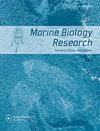幼大西洋鲭鱼(Scomber scombrus)在挪威海岸北部新苗圃的摄食
IF 1.2
4区 生物学
Q4 ECOLOGY
引用次数: 2
摘要
摘要从2006年到2014年,东北大西洋的鲭鱼种群数量大幅增加,同时也出现了大量招募。这导致了鲭鱼在地理上明显向北扩张,随后幼鱼涌入挪威水域。这项工作的目的是研究夏季在挪威海岸新的养殖场饲养的幼年鲭鱼的饮食和饲养强度。幼鱼在北至70°N的地方觅食。首次分析了在同一地点同时出现的幼年和成年鲭鱼的胃含量。几乎80%的幼年鲭鱼胃里都有猎物,在同一地区,幼年鲭鱼的饱腹感与成年鲭鱼相似。幼鱼捕食各种各样的猎物,似乎既利用被动滤食性,也利用主动颗粒食性。最丰富的猎物群是阑尾,占胃重量的31%。幼鱼以与成年鱼相似的猎物为食,但由于成年鲭鱼更多地以磷虾为食,它们的饮食生态位有所不同。因此,幼年鲭鱼可以在高纬度地区成功生存并以各种猎物为食,并有可能成为该地区其他浮游鱼类的觅食竞争对手。本文章由计算机程序翻译,如有差异,请以英文原文为准。
The diet of juvenile Atlantic mackerel (Scomber scombrus) feeding in new northern nursery areas along the Norwegian coast
ABSTRACT The North-east Atlantic mackerel stock size increased substantially from 2006–2014 coinciding with high recruitment. This resulted in a pronounced northerly geographic expansion of mackerel, followed by an influx of juvenile mackerel into Norwegian waters. The objective of this work was to study the diet and feeding intensity of juvenile mackerel at the new nursing grounds along the Norwegian coast during the summer. Juvenile mackerel were feeding as far north as 70°N. Stomach content was analysed for the first time from co-occurring juvenile and adult mackerel at the same locations. Almost 80% of all juvenile mackerel had prey in their stomachs, and juveniles had similar stomach fullness as adult mackerel in the same areas. The juveniles preyed on a wide variety of prey species and seemed to utilize both passive filter feeding and active particulate feeding. The most abundant prey group was Appendicularia, accounting for 31% of the stomach content by weight. Juveniles fed on similar prey species as adults, but their diet niche differed somewhat as adult mackerel fed more on krill. Juvenile mackerel can thus successfully survive and feed on various prey in high latitudes and can potentially be a feeding competitor to other planktivorous fish species in the area.
求助全文
通过发布文献求助,成功后即可免费获取论文全文。
去求助
来源期刊

Marine Biology Research
生物-海洋与淡水生物学
CiteScore
2.10
自引率
0.00%
发文量
55
审稿时长
6-12 weeks
期刊介绍:
Marine Biology Research (MBRJ) provides a worldwide forum for key information, ideas and discussion on all areas of marine biology and biological oceanography. Founded in 2005 as a merger of two Scandinavian journals, Sarsia and Ophelia, MBRJ is based today at the Institute of Marine Research, Bergen, Norway. The Journal’s scope encompasses basic and applied research from all oceans and marine habitats and on all marine organisms, the main criterium for acceptance being quality.
 求助内容:
求助内容: 应助结果提醒方式:
应助结果提醒方式:


